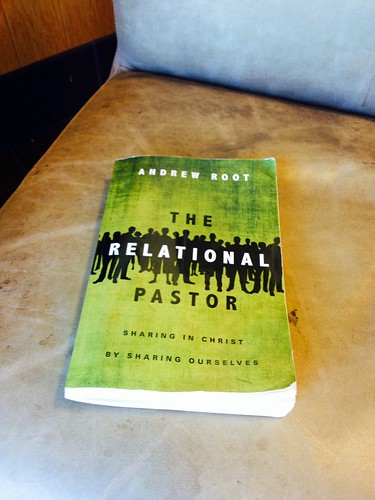 Note: I was sent this book from the publisher and as always I am not required to give a positive review but an honest one. I am disclosing this in accordance with the Federal Trade Commission’s 16 CFR, Part 255.
Note: I was sent this book from the publisher and as always I am not required to give a positive review but an honest one. I am disclosing this in accordance with the Federal Trade Commission’s 16 CFR, Part 255.
Great books have a way of marking certain seasons of life. Similar to when you watch a great movie or witness a great sporting event and contextualize your enjoyment of it during a particular time in life. I’ll always remember watching Shawshank Redemption has part of my senior year of college and holding a crying newborn the night the Giants won Super Bowl XLVI.
At the risk of sounding dramatic, I’ll remember reading The Relational Pastor during this beautiful New England summer on my back patio with a cup of french-pressed George Howell coffee. I liked it so much that I read it twice. In addition to the excellent content was the timing of the reading. In a summer that intentionally sought spiritual renewal, Root’s words were welcomed and needed.
Here’s what I like so much about The Relational Pastor:
As a fan of Revisiting Relational Youth Ministry, I continue to love Root’s thesis – We as Christian leaders cannot use relationships to control or manipulate others into our agenda. Jesus’ incarnation shows us that we must share in the joy, suffering and various aspects of life of the other, and share our own with the other. This makes our relationships agenda-free, unconditional, and truly Christian. At least that’s what I hear him saying.
Root offers a summary of the evolution of the pastorate, focusing on our currently American context – the oil-age. If you’ve read a bit on ministry in the suburbs and in our current American historical context. Some of this will be familiar but if you need a quick crash course, grab Church in the Inventive Age by Doug Pagitt.
Chapter 3 “Transitioning from Self-Help to Entertainer” has familiar critique but Root does a great job in taking the critique deeper. Using economist Jeremy Rifkin’s perspectives on communication, energy and the changing world, Root promises to “provide a vision of the church and pastor congruent with Rifkin’s insight but standing on a deep and central Christian commitment.”
He delivers on this chapter after chapter. If you like Bonhoeffer and Barth, if you are fascinated by neuroscience, relational intelligence, and if you true believe that Christian doctrine should inform us in a practical sense and not only in the academic, then at the very least, most readers will find The Relational Pastor worthy of their time. It’s not “how to,” but more about being your true self in Christ in the life-sharing context of pastoral ministry.
Given how much I loved it, there was still a good bit of my inner-monologue yelling, “Yeah, but what about …?” and “Well, come on, I’m not sure about …” I’m probably wrong on a few things here. But I could be a little right too. Regardless, this inner debate was part of what I enjoyed so much reading on my patio. So here’s a bit of that.
Sometimes I wondered if Root thought the only part of pastoring was the relationship aspect. Now I’m sure he doesn’t but I would have loved more time on the preaching/teaching elements of the pastorate. Chapter 14 (How Story, Teaching and Preaching Fit) was very needed and I felt that it needed more, particularly the part on preaching. While I am grateful that so much church culture is created throughout the other aspects of the local body, obviously so much is also created from the pulpit.
In Ch. 14, I appreciated his ideas on teaching congregational prayer as imaginative storytelling, encouraging eschatological imagination (the new, strange world of the Kingdom of Jesus) to the church, etc. But even this felt unnecessarily limited to a small or personal context.
I know Root is critical of the large self-helpy, mega-church (I am too) but not all large churches are like that. I am sure he knows this and so I kept looking for some applicable contexts of his principles in a setting that went beyond one-on-one, small groups or a small-church context. The mega church model may not be all it’s cracked up to be, but too many small churches suck too. I did feel an over-emphasis on smaller models and a near discrimination against larger. (I may need to go back and read On the Verge with Hirsch and Ferguson to get some healing – “Big churches can do mission”. I think many can be relational too.)
Some of this is due to my context, my baggage and perhaps even my limited imagination as well. DO NOT let my inner-monologue dissuade you from reading Root’s truly excellent contribution to pastoral ministry. In short, most of what Andy talks about is in a one-on-one context and the book is worth the time just for processing how our Christian faith and theology should inform/shape us as we spend time with people as in those in our church, those not in our Christian fellowship, those we call friends, those whom we call family.
I highly recommend it for anyone who values relationships in ministry. And if you feel you have extraordinary relational gifts, you should read this a few times too ;) It’s a great book, I just wanted a little more on an even bigger context and so, this is what I’m asking: If Andy hasn’t already started, I think it’s time for him to write The Relational Church.
For more, check out:
Andrew’s other books on his blog
His post: Relational Ministry, the Pastor, and Inception
“Relational Ministry Is Not a Strategy” by Scot McKnight





Speak Your Mind